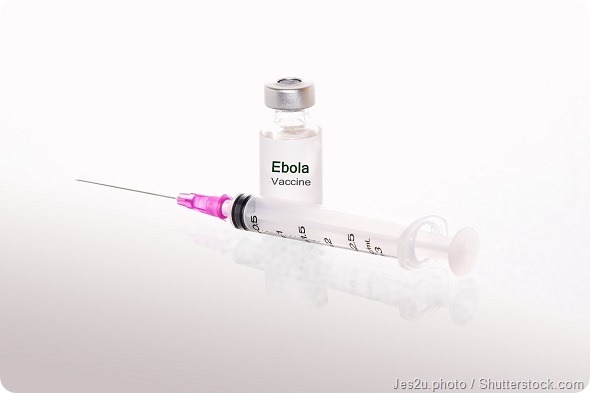By Kate Bass BSc
Interim findings from a clinical trial (PREVAIL) in which two experimental Ebola vaccines were given to more than 600 people in Liberia indicate that the vaccines are safe for use in humans. Based on these positive results, the vaccines may continue into the next stage of clinical evaluation; a phase 3 trial sponsored by the National Institute of Allergy and Infectious Diseases (NIAID), part of the National Institutes of Health.
Volunteers participating in the PREVAIL trial, were randomly assigned to receive a single injection of the cAd3-EBOZ vaccine, the VSV-ZEBOV vaccine, or a saline (placebo) injection. Neither the volunteers nor the trial staff knew which volunteers were receiving vaccine and which were receiving placebo in order to avoid the potential for bias in the results. Such a randomized, double-blind, placebo-controlled trial is considered to be the “gold standard” in clinical research. Assessments of the efficacy and safety and efficacy of each treatment were made regularly in all the volunteers. Although the trial has not yet completed, interim results show that both vaccines appear to be safe and justify further testing.

Anthony S. Fauci, Director of NIAID commented:
We are grateful to the Liberian people who volunteered for this important clinical trial and encouraged by the study results seen with the two investigational Ebola vaccine candidates. Now we must move forward to adapt and expand the study so that ultimately we can determine whether these experimental vaccines can protect against Ebola virus disease and therefore be used in future Ebola outbreaks.
Further enrollment into the ongoing PREVAIL study at Redemption Hospital in Monrovia, Liberia is proposed to continue until the end of April. Once this is complete, the study will provide data from approximately 1,500 people. All volunteers in the study will be monitored for at least a year. This follow-up will include blood tests to check that the immune responses to the vaccine last well after vaccination. It is anticipated that the trial will be completed in June 2016.
Researchers then plan to enroll 27,000 people in Liberia who are at risk of Ebola infection into a Phase 3 trial. In order to confirm that the vaccine effectively prevents people from contracting Ebola, they need to be likely to come into contact with the virus. However, there has only been only one new confirmed case of Ebola infection in Liberia since February. It is therefore possible that recruitment into this trial may be extended to include people from other West African countries to ensure that the effectiveness of the vaccine is properly tested.
A further study of Ebola survivors is also planned to define and better understand the natural history and after-effects of Ebola virus disease. Enrollment into this study may soon begin at four sites in Monrovia, Liberia and the United States, subject to regulatory approval.
Source:
National Institute of Allergy and Infectious Diseases press release, 26 March 2015. Available at http://www.niaid.nih.gov/news/newsreleases/2015/Pages/PREVAILphase2.aspx